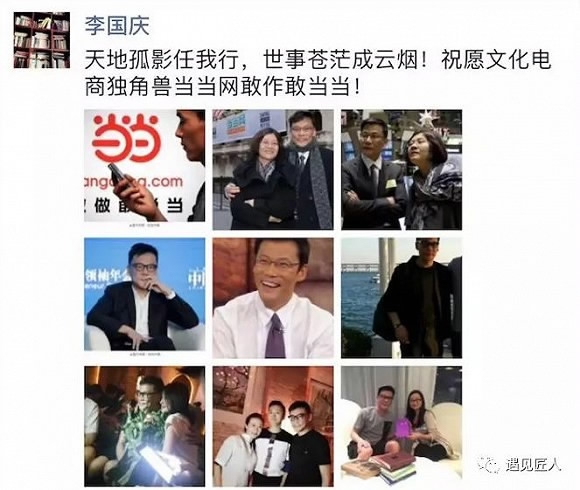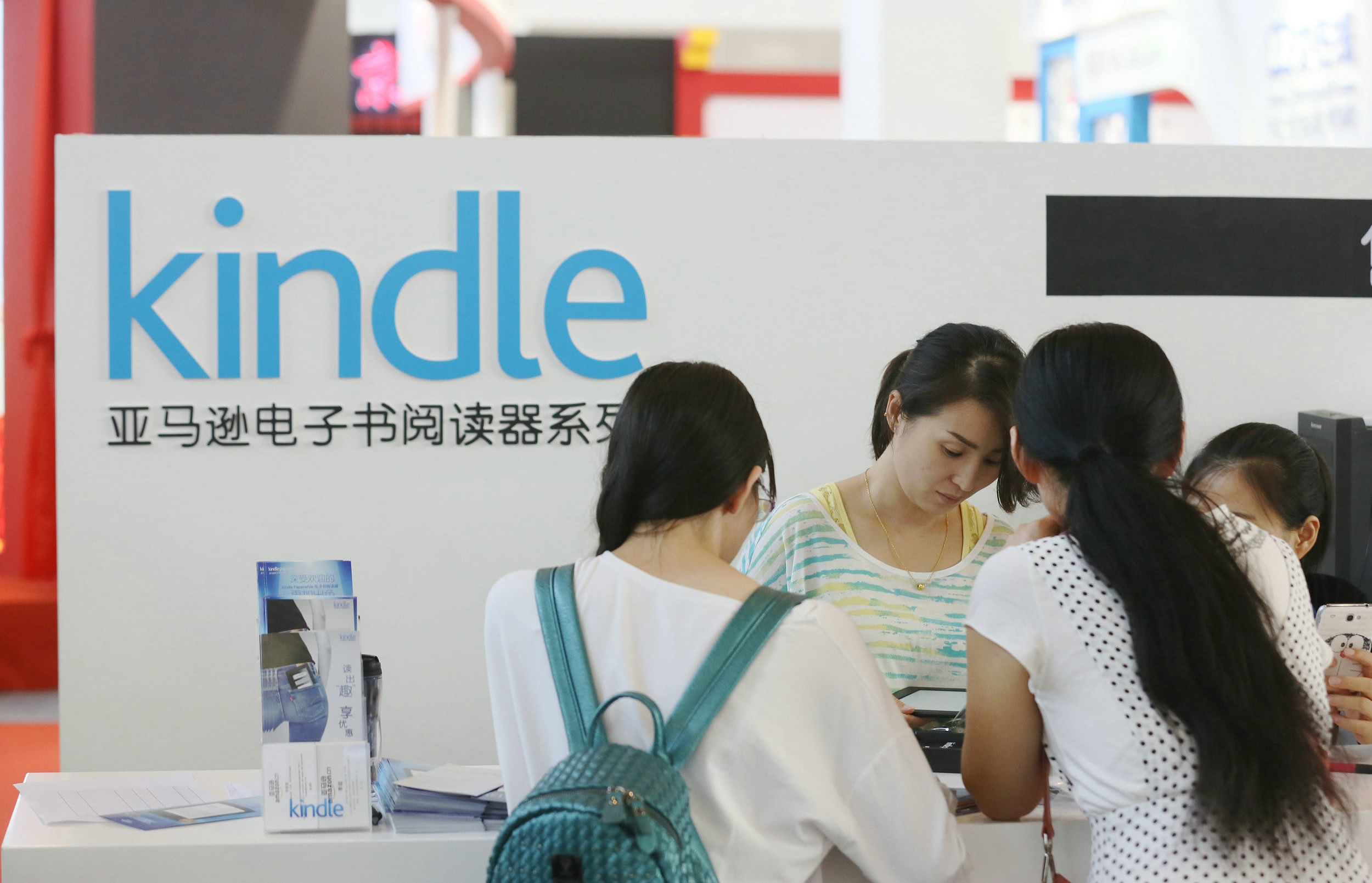
Business
16:17, 12-Mar-2018
Early e-commerce giant Dangdang’s failure to reach its potential
Nicholas Moore

A cryptic message from the CEO of Chinese e-commerce platform Dangdang has fuelled speculation that it is about to be taken over, after falling behind rivals like Alibaba and JD.com.
Tianjin Tianhai Investment Co. Ltd, a subsidiary of the HNA Group, announced via a stock exchange filing on Friday that it was looking to buy a stake in Dangdang.
The filing came months after HNA, which itself is under pressure over its internal finances and expansion strategy, was reportedly considering a 90 percent stake in the e-commerce platform, valuing Dangdang at 1.2 to 1.5 billion US dollars.
On Sunday, Li posted a mysterious message on Wechat Moments, which can roughly be translated to “I have walked alone along my own path, and now the past is the past, what is done is done. I hope every up and coming online cultural enterprise can be as brave as Dangdang!”

Screenshot from Li Guoqing's Wechat Moments.
Screenshot from Li Guoqing's Wechat Moments.
A tale of two tech companies: Alibaba and Dangdang
In April 1999, Ma Yun, a former English teacher and website designer, set up the fledgling e-commerce platform Alibaba in east China’s Hangzhou. Six months later in Beijing, Li Guoqing, first a top student at Peking University and then a successful businessman in the 1990s, founded Dangdang with his wife, Yu Yu.
Li and Yu had met in the United States several years earlier, where both had been impressed by Amazon.com, then a rapidly growing online bookstore.
Spotting the potential of e-commerce, Dangdang was born, and from that moment would find itself labeled “the Chinese Amazon” – arguably a reputation that held Dangdang back while Alibaba surged forward.
Today, Ma Yun is one of China’s richest men, in charge of a business empire worth close to 500 billion US dollars that has spread far beyond e-commerce into finance, entertainment, bricks-and-mortar retail and international trade.
With a value of around 1.5 billion US dollars, Dangdang is far from a failure. Domestically it remains a well-known brand, and for many Chinese readers it is still one of the first ports of call for buying books online.

CEO and co-founder of Dangdang Li Guoqing, at the China Entrepreneur Summit in Beijing, December 9, 2017. /VCG Photo
CEO and co-founder of Dangdang Li Guoqing, at the China Entrepreneur Summit in Beijing, December 9, 2017. /VCG Photo
However, almost two decades after its founding, Dangdang has clearly not reached its full potential when compared to Alibaba. Market research firm Analysys claimed in a recent report that Dangdang only had 0.8 percent market share in China’s e-commerce sector, well behind the 89.1 percent share enjoyed by three frontrunners Tmall, JD.com and VIP Shop.
Even when it comes to book sales, Dangdang’s strongest sector, it was beaten into second place last year by JD.com.
New platforms like Tencent’s China Literature have innovated according to the needs of young Chinese users, scoring revenue growth of almost 60 percent between 2015 and 2016 and leaving Dangdang struggling to keep up.
Staying relevant in China’s e-commerce sector
Back in the early 2000s, few would have predicted the current gulf that lies between Alibaba and Dangdang.
Reports at the time suggested Amazon had tabled a bid worth up to 200 million US dollars to buy out its Chinese counterpart – a significant sum offered well ahead of China’s e-commerce boom.
According to news portal Jiemian, Li responded to the Amazon offer by telling investors he wanted more time to triple or quadruple the size of the company before considering a sale.
Later in 2013, Li told the media that he welcomed financing if it could benefit the company, but that he would always reject anyone buying his company outright.

A Dangdang physical bookstore in Fuzhou, east China's Fujian Province, March 4, 2018. /VCG Photo
A Dangdang physical bookstore in Fuzhou, east China's Fujian Province, March 4, 2018. /VCG Photo
In 2010, Dangdang listed on NASDAQ in the US, becoming the first Chinese business-to-consumer e-commerce platform to go public overseas. The IPO saw its share price initially soar by 86 percent – a record for an overseas-listed Chinese company.
However, the US IPO was perhaps where everything started to go wrong. Tech in Asia described Dangdang as the third worst-performing Chinese tech stock on record, plummeting in value by as much as 90 percent before delisting in 2016, worth a quarter of its original listing price.
A failure to diversify and expand
The last decade has seen Alibaba, JD.com and Amazon diversify and expand, moving into AI, cloud services and leading from the front rather than playing catch up to their rivals.
Dangdang has failed to follow suit, and instead retreated into its core market of selling books.
Visit Tmall or JD.com, and you will instantly recognize some of the world’s biggest brands on sale to Chinese consumers.
Dangdang still offers electronics, clothing and other products, but the lack of major international brands speaks volumes about the gap that lies between it and rival platforms that consumers go to to buy anything they want.
Dangdang's launch of its own range of Kindle-style e-readers represented a failure to notice trends unique to China, with the Chinese Academy of Press and Publication reporting in 2016 that 66.1 percent of Chinese adults used their phones to read, rather than e-readers.

Dangdang's move to rival Amazon's Kindle with its own range of e-readers arguably came too late, and failed to meet the needs of Chinese consumers. /VCG Photo
Dangdang's move to rival Amazon's Kindle with its own range of e-readers arguably came too late, and failed to meet the needs of Chinese consumers. /VCG Photo
In 2015, a year when the company was suffering from its worst drop in sales since 2013 and making losses of more than 20 million yuan, Dangdang announced plans to launch 1,000 bricks-and-mortar bookstores across the country.
Investors were likely left bemused by the move into what China Daily called a “sunset industry,” with physical bookstores “struggling to survive in the Internet era.”
If the Tianhai deal to purchase a stake in Dangdang goes ahead, it remains to be seen whether or not Li Guoqing will remain in his position as CEO, or retain his power as founder of the company.
Li’s previous resistance to external influences may have seen Dangdang fail to reach the heights of Alibaba, but 2017’s sales figures give the company hope for the future under his stubborn leadership.
Last year, the number of new paying users increased by 72 percent, and book sales were up 126 percent, as Li vowed earlier this year to focus on its core industry of selling physical, digital and audio books.

SITEMAP
Copyright © 2018 CGTN. Beijing ICP prepared NO.16065310-3
Copyright © 2018 CGTN. Beijing ICP prepared NO.16065310-3